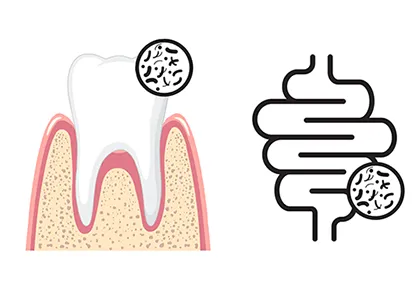Biofilms at mucosal surfaces
Mucosal membranes line the nasal and oral cavities, gastrointestinal, genital and urinary tracts, trachea/lungs, and eyelids, and provide protection and lubrication. Mucosal biofilms refer to biofilms that grow on these surfaces and are linked to both health and disease. One focus across the MBRH is the study of dental caries (tooth decay), the most prevalent chronic disease in both children and adults, and periodontitis (gum disease), which is linked with a range of chronic diseases including cardiovascular disease, diabetes, rheumatoid arthritis, and pregnancy complications. Other major areas of research include understanding vaginal dysbiosis, which underpins conditions such as bacterial vaginosis, sexually transmitted infections, infertility, and preterm birth; understanding dysbiosis in the gut, which can lead to chronic inflammatory diseases such as Crohn’s disease and cancer; and probing how biofilms contribute to specific oral, enteric and chronic lung infections.
Biofilms at mucosal surfaces is a research project of the Multiscale Biofilm Research Hub. Find out more about the Hub here: https://www.kcl.ac.uk/research/mbrh.
Other research groups involved in the project include: Banerjee, Bergeron, Carpenter, Curtis, Edwards, Flak, Garnett, Long, Lorenz, Mason, Molteni, Moyes, Naglik, Neves, Proctor, Sousa, Sutton, Tribe, Whelan, Zaric









